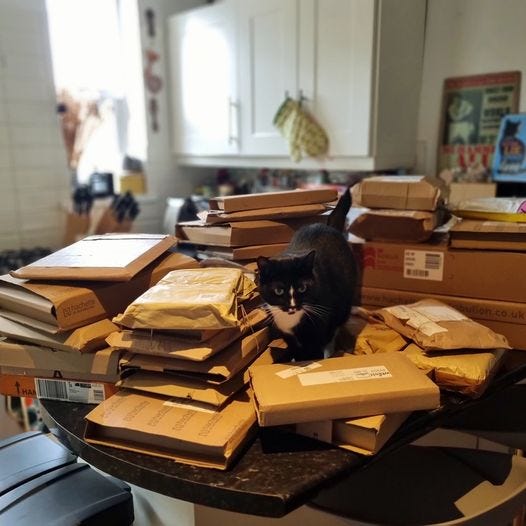At the beginning of the year, I had the great honour to be asked to be a book judge for the Historical Writers’ Association’s 2024 Crown Awards. The HWA was created to support and promote the professional and personal interests of authors, publishers and agents of historical writing. Every year, they promote their in-house awards, the HWA Crown Awards, which seek to celebrate the best historical writing, fiction and non-fiction published in the UK.
These awards are well-respected in the industry and I did have some trepidation. I had never been a book judge before, I wasn’t sure what it entailed. But since I am not writing at the moment and have plenty of spare time on my hands, it seemed like a golden opportunity to see how others write and to explore subjects outside the fifteenth century.
Well, to say I was unprepared for the avalanche of books that would soon brighten my doorstep is something of an understatement. Across several months, many dozens of books would be delivered by a champion of a postman, thick hardbacks often packed four or five to a carton. Carting them up the stairs to my flat, I can say with all sincerity I didn’t expect being a book judge would be so much physical work.
I delved into my daunting task with enthusiasm, plucking books off the pile with reckless abandon and keeping a trusty little notepad handy for my thoughts on each book. Aware time was very much against me, I used every spare moment I had to delve into the books, whether reading in bed before and after work, in the coffeeshop, in the pub, on the tube, on the train, wherever I was sitting with time to spare, I was reading.
I was amazed by the quality of writing out there, and fascinating at getting a glimpse into the workings of other authors, how they structured their books, their use of primary sources, how some authors used present tense, some past, others put themselves into the narrative and others remained an aloof observer. And of course the books themselves – there are many hugely talented graphic designers creating scores of eye-catching, often ingenious, covers intended to draw in the browsing shopper and turn them into a reader.
With my fellow judges, Isabelle Grey, Pete Brown, Jacqueline Riding and Annie Whitehead, each very talented writers in their own right, we poured over the books, exchanged notes and thoughts, and slowly began to narrow in on our collective favourites, books we believed set out their objective and lived up to the mission the author had set themselves. I was particularly keen to highlight books that I would personally recommend to a friend who had no prior interest in reading narrative non-fiction – that is surely the sign of an excellently written book.
It truly has been rewarding to do, and I’ve discovered new-found areas of interest I would never have known I would enjoy – I will, over the following months, share in more detail some of those books.
And so, here is the longlist for the 2024 HWA Non-Fiction Prize, with the judges’ summary.
I Seek a Kind Person by Julian Bother
Illuminating account of a lesser-known aspect of the war. The author's personal experience leads to wider research which details moving accounts of children and adults caught up in the war
Final Verdict by Tobias Buck
Giving details not only of the trial but the wartime experiences of those involved, this harrowing account raises many moral questions and stimulates debate on a wider scale. Very affecting
Messalina: The Life and Times of Rome’s Most Scandalous Empress by Honor Cargill-Martin
An engaging and completely successful attempt to restore the reputation of the empress. The author reevaluates primary sources to produce a thoroughly readable and thought-provoking book
Don’t Let's Be Beastly to the Germans: The British Occupation of Germany 1945-49 by Daniel Cowling
A fascinating, highly readable exploration of the work of the Control Commission in Germany after WWII. Personal accounts bring to the life the huge task of reconstruction, denazification and ‘winning the peace'
The Shoulders We Stand On: How Black and Brown People Fought For Change in the United Kingdom by Preeti Dhillon
How black and brown people, in the 1960s–80s, fought for their rights, and in doing so, changed things for all British people. An essential book for our understanding of race in Britain and its place in our broader history
Survivors: The Lost Stories of the Last Captives of the Atlantic Slave Trade by Hannah Durkin
Impeccably researched, this book allows readers to hear the voices of the survivors of the slave ship, reminding all how recently this abhorrent trade was still operating. Deeply moving
The Exiled: Empire, Immigration and the Ugandan Asian Exodus by Lucy Fulford
An evocative study that examines an overlooked aspect of 20thC immigration. Personal and often traumatic reading, but nevertheless a nuanced account that reveals the complexities of modern Britain and the haunting legacy of empire
Four Shots in the Night: A True Story of Espionage, Murder and Justice in Northern Ireland by Henry Hemming
A scrupulous uncovering of the scale of British intelligence operations in Northern Ireland from the Troubles to the Good Friday Agreement. All-too human stories on both sides highlight moral dilemmas of searching for peace
Agincourt: Battle of the Scarred King by Michael Livingstone
This compelling, at times provocative study has redrawn the map concerning medieval England's greatest triumph. Complex history effortlessly conveyed in a conversational yet authoritative manner. A masterful work that thrills throughout
The Picnic: An Escape to Freedom and the Collapse of the Iron Curtain by Matthew Longo
An evocative oral history that reads like a fast-paced political thriller. At a heightened time of ideological tension in Europe, a penetrating and timely reminder that brave acts of unity can bring the walls of division tumbling down
A Dirty, Filthy Book: Annie Besant’s Fight for Reproductive Rights by Michael Meyer
Annie Besant’s public battle for women’s control over their reproductive health in the Victorian Age still resonates over 150 years on. This is vital but little-known history, here told with vigour and scholarly heft.
Impossible Monsters: Dinosaurs, Darwin and the War Between Science and Religion by Michael Taylor
Clear, entertaining. The attempts by Christian leaders to deny, spin and ultimately integrate into Biblical teaching new discoveries of fossil evidence of dinosaurs and human origins, against slowly-advancing theories of evolution
We will announce the shortlist on 16 October, and finally the winner at the Awards ceremony in London on 20 November.





